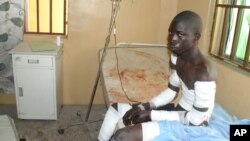Suspected Islamic militants attacked two cities in northern Nigeria Monday with multiple suicide bombings, grenades, and gunfire, killing at least 50 people.
The first blast Monday took place at a mosque on the outskirts of Maiduguri. Officials say at least 20 people died in the attack by suspected Boko Haram militants, with more than 90 wounded.
In another attack in Maiduguri, suicide bombers blew themselves up in the Buraburin neighborhood, killing several people.
In the town of Madagali, about 150 kilometers from Maiduguri, officials said two female suicide bombers killed at least 30 people in twin blasts in a city market.
The violence comes one day after suspected Boko Haram militants launched new attacks on Maiduguri, drawing army fighters into gun battles. Reports said many civilians were caught in the cross-fire.
Maiduguri is the birthplace of Boko Haram, which has been fighting since 2009 to establish a strict Islamic state in northern Nigeria.
Last week, Nigerian President Muhammadu Buhari said his country had "technically" won the war against Boko Haram, in comments issued days before his self-imposed deadline for defeating the militant group.
Buhari told British radio that Boko Haram was no longer capable of carrying out conventional attacks against security forces or population centers. He said they have now "reverted" to using improvised explosive devices instead.
An army offensive this year recaptured most of the territory that Boko Haram fighters had seized over the past few years.
Buhari won the presidency in March on a platform that included a pledge to wipe out Boko Haram. He has vowed to defeat the group by the end of this year.
A report last month said Boko Haram has become the deadliest terrorist group in the world, killing more than 6,000 people in 2014, in addition to several thousand more this year.
Acting on information provided by a captured insurgent, Nigerian troops "intercepted and destroyed" 13 suicide bombers and arrested one female suicide bomber in repelling the attackers, Maj. Gen. Lamidi Adeosun, the commander prosecuting Nigeria's war against Boko Haram, told reporters.
Maiduguri, the city under attack, is the birthplace of Boko Haram, which emerged as a much more radical entity after Nigerian security forces launched an all-out assault on their compound in the city, killing 700 people in 2009.
Militants firing indiscriminately from the back of three trucks attacked the outlying village of Dawari, soldiers engaged them, and as people were fleeing, a woman ran into the area yelling "Boko Haram, Boko Haram." When people gathered, she detonated herself, according to village head Bulama Isa.
A rocket-propelled grenade then exploded, setting alight grass-thatched huts, and a second woman blew herself up, according to Isa. Among those killed was the village chief and 10 of his children, according to residents Ahmed Bala and Umar Ibrahim.
A soldier said the insurgents fired rocket-propelled grenades into four residential areas on the outskirts of the city. Soldiers fired back, and many civilians were caught in the crossfire, according to the soldier, who spoke on condition of anonymity because he is not authorized to speak to journalists.
Three suicide bombers blew themselves up at a home near Bakassi Estate, killing 18 people Sunday evening, another soldier told The Associated Press.
A nurse at Maiduguri Specialist Hospital said dozens of critically wounded, mainly children and women, may not survive. The nurse, who spoke on condition of anonymity because she is not authorized to speak to reporters, said the hospital was so overflowing with patients that some had to be cared for in the maternity ward.
About 60 people had wounds from bullets and shrapnel from explosive devices, she said. Other wounded people had to be sent to other hospitals in the city.
Among them was a baby found dead, still tied to the back of her mother, who survived after being hit by shrapnel, the nurse said.
It was hard to do a body count because so many had been blown into pieces, she said, describing torsos and dismembered arms and legs.
Maiduguri, a city of about 1 million people, now hosts almost as many refugees, among 2.5 million people driven from their homes in the 6-year-old Islamic uprising. About 20,000 people have been killed in Nigeria and hundreds others elsewhere as the insurgents have carried their conflict across its borders into Cameroon, Niger and Chad.
Some material for this report came from AP.





